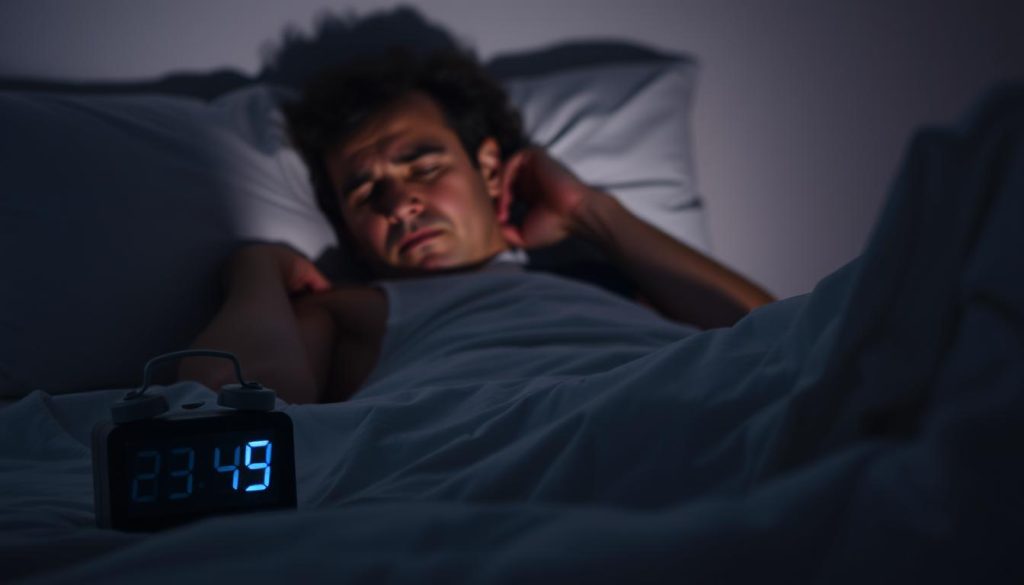As we age, our priorities often shift towards maintaining a healthy lifestyle. One crucial aspect that contributes to overall well-being is sleep. Research has shown that both the quality and quantity of sleep play significant roles in determining our lifespan.
While many of us focus on getting enough sleep duration, it’s equally important to consider the sleep quality. Poor sleep quality can lead to various health issues, ultimately affecting our longevity. In this article, we’ll delve into the importance of both sleep quantity and quality, and explore which one has a greater impact on our lifespan.
Key Takeaways
- Understanding the role of sleep in determining longevity
- The importance of both sleep quality and quantity
- How poor sleep quality can affect overall health
- The impact of sleep duration on lifespan
- Comparing sleep quality and quantity to determine which matters more
The Science of Sleep and Longevity
Sleep, often considered a passive state, is now recognized as a critical factor in the pursuit of longevity. The intricate relationship between sleep and aging has become a focal point of research, shedding light on how sleep patterns influence our overall health and lifespan.
How Sleep Affects Cellular Aging
Cellular aging is a complex process influenced by various factors, including sleep. During sleep, our bodies undergo numerous restorative processes that help maintain cellular health.
Telomere Length and Sleep Patterns
Telomeres, the protective caps at the ends of chromosomes, shorten as we age. Research has shown that poor sleep quality is associated with shorter telomeres, indicating accelerated cellular aging. Studies have found that individuals with consistent, high-quality sleep tend to have longer telomeres, suggesting a potential link between sleep and longevity.
Oxidative Stress Reduction During Sleep
Sleep also plays a crucial role in reducing oxidative stress, which occurs when there’s an imbalance between free radicals and antioxidants in the body. Adequate sleep helps mitigate oxidative stress, thereby potentially slowing down the aging process.
Research Linking Sleep Patterns to Lifespan
Numerous studies have investigated the connection between sleep patterns and lifespan, yielding valuable insights into how sleep duration and quality impact our longevity.
Landmark Studies on Sleep Duration and Mortality
Several landmark studies have explored the relationship between sleep duration and mortality rates. These studies have found that both short and long sleep durations are associated with increased mortality risk, highlighting the importance of finding an optimal sleep duration.
Blue Zones and Sleep Habits of Centenarians
The Blue Zones, regions around the world where people live exceptionally long lives, offer valuable insights into the sleep habits of centenarians. Research has shown that individuals in these areas often have consistent sleep patterns and prioritize rest, contributing to their longevity.
Understanding the Sleep Cycle
Understanding the sleep cycle is fundamental to appreciating the intricate mechanisms that govern our sleep patterns. The sleep cycle is a dynamic process that includes multiple stages, each playing a unique role in our rest and overall health.
The 5 Stages of Sleep Explained
Sleep is not a uniform state but rather a cycle that includes five distinct stages. These stages are categorized into two main types: non-REM (NREM) sleep and REM sleep.
The first three stages are NREM sleep, with Stage 1 being the lightest sleep, followed by Stage 2, and then Stage 3, which is also known as deep sleep or slow-wave sleep. Stage 4 and Stage 5 are sometimes combined as REM sleep, with Stage 4 being the initial REM sleep stage and Stage 5 continuing this stage.
Light Sleep vs. Deep Sleep Functions
Light sleep, encompassing Stages 1 and 2, is crucial for transitioning into deeper sleep stages. It’s during these stages that our body starts to relax, with a decrease in body temperature and heart rate.
Deep sleep, or Stage 3, is vital for physical restoration. It’s the stage where the body repairs and regenerates tissues, builds bone and muscle, and strengthens the immune system.
Sleep Cycle Duration and Patterns
A full sleep cycle typically lasts around 90 to 120 minutes. Throughout the night, we go through multiple cycles, with the proportion of deep sleep decreasing and REM sleep increasing as the night progresses.
The Importance of REM and Deep Sleep for Health
Both REM and deep sleep are crucial for our health, serving different but complementary functions.
Memory Consolidation During REM
REM sleep is significant for mental restoration, particularly for memory consolidation. During REM sleep, the brain processes and consolidates memories, transferring information from the hippocampus to the neocortex for long-term storage.
Physical Restoration During Deep Sleep
Deep sleep, as mentioned, is essential for physical restoration. It’s during this stage that the body undertakes repair and regeneration, which is vital for maintaining physical health and preventing the deterioration associated with aging.
Sleep Quality vs. Sleep Quantity: What Matters More for Longevity
When it comes to longevity, understanding the impact of sleep quality versus quantity is crucial. As we delve into the intricacies of sleep, it becomes evident that both aspects play significant roles in our overall health.
Defining Sleep Quality: Beyond Hours in Bed
Sleep quality refers to the restorative and rejuvenating aspects of sleep. It’s not just about the duration but the depth and restfulness of sleep.
Measurable Markers of Quality Sleep
Markers of quality sleep include sleep efficiency, sleep fragmentation, and the presence of deep sleep and REM stages. These factors contribute to how rested and refreshed one feels upon waking.
Understanding Sleep Quantity: Is 8 Hours Really the Magic Number?
The notion that 8 hours of sleep is ideal has been a long-standing recommendation. However, sleep needs can vary significantly among individuals.
Historical Changes in Sleep Duration Recommendations
Historically, sleep duration recommendations have evolved. From as early as the 19th century, the recommended 8 hours has been a benchmark, but recent studies suggest that this might not be a one-size-fits-all solution.
The Interplay Between Quality and Quantity for Longevity
The interplay between sleep quality and quantity is intricate. While quantity provides the necessary duration for restorative processes, quality ensures that these processes are effective.
When Quality Can Compensate for Quantity (and Vice Versa)
“Quality can sometimes compensate for quantity to a certain extent, but consistently poor quality sleep can negate the benefits of longer sleep duration.”
Conversely, high-quality sleep can sometimes make up for slightly less sleep quantity.
The Health Consequences of Poor Sleep Quality
Poor sleep quality has far-reaching consequences for our overall health, affecting everything from our cardiovascular system to our cognitive function. When sleep is fragmented or of poor quality, it can lead to a cascade of health issues.
Cardiovascular Risks of Fragmented Sleep
Fragmented sleep has been linked to an increased risk of cardiovascular disease. This is partly due to the impact of poor sleep quality on blood pressure regulation.
Blood Pressure Regulation and Sleep Quality
During normal sleep, blood pressure dips, giving the cardiovascular system a chance to rest. However, with fragmented sleep, this natural dip may not occur, leading to sustained high blood pressure.
Metabolic Disruptions from Low-Quality Sleep
Low-quality sleep can also disrupt metabolic processes, including insulin sensitivity.
Insulin Sensitivity and Sleep Architecture
Poor sleep architecture can lead to reduced insulin sensitivity, increasing the risk of developing type 2 diabetes.
Cognitive Decline and Neurological Impact of Poor Sleep Quality
Furthermore, poor sleep quality is associated with cognitive decline and neurological issues. Quality sleep is essential for brain clearing mechanisms.
Brain Clearing Mechanisms During Quality Sleep
During quality sleep, the brain undergoes a process called glymphatic flow, clearing out toxins that can lead to neurodegenerative diseases if accumulated.

| Health Consequence | Effect of Poor Sleep Quality |
|---|---|
| Cardiovascular Risks | Increased risk of cardiovascular disease due to sustained high blood pressure |
| Metabolic Disruptions | Reduced insulin sensitivity, increasing the risk of type 2 diabetes |
| Cognitive Decline | Impaired cognitive function and increased risk of neurodegenerative diseases |
The Dangers of Insufficient Sleep Quantity
The dangers of insufficient sleep quantity are multifaceted, influencing our immune system, hormonal balance, and mortality risk. When we don’t get enough sleep, our body’s ability to function optimally is compromised.
Immune System Suppression from Sleep Deprivation
Sleep plays a crucial role in the functioning of our immune system. During sleep, our body produces cytokines that help fight off infections. Sleep deprivation can lead to a decrease in the production of these cytokines, making us more susceptible to illnesses.
T-Cell Activity and Sleep Duration
T-cells are a type of white blood cell that plays a key role in our immune response. Research has shown that sleep duration can affect T-cell activity. Adequate sleep is necessary for the proper functioning of T-cells, highlighting the importance of sufficient sleep quantity.
Hormonal Imbalances Caused by Short Sleep
Hormonal balances are crucial for various bodily functions, including growth, metabolism, and reproductive processes. Short sleep can disrupt the balance of hormones such as cortisol, leptin, and ghrelin.
Cortisol, Leptin, and Ghrelin Disruption
Cortisol is known as the stress hormone, and its levels can be affected by sleep deprivation. Leptin and ghrelin are hormones that regulate appetite. Short sleep can lead to increased levels of ghrelin and decreased levels of leptin, potentially causing weight gain.
Increased Mortality Risk Associated with Chronic Sleep Restriction
Chronic sleep restriction has been linked to an increased risk of mortality. Studies have shown that both short and long sleep durations can have adverse effects on health, following a U-shaped curve.
The U-Shaped Curve of Sleep Duration and Lifespan
The relationship between sleep duration and lifespan follows a U-shaped curve, indicating that both insufficient and excessive sleep can lead to a shorter lifespan. This highlights the importance of finding the optimal sleep duration for longevity.
Optimizing Sleep Quality: Practical Strategies
Improving sleep quality is a multifaceted approach that involves several practical strategies. By focusing on the sleep environment, pre-sleep routines, and the use of technology, individuals can significantly enhance their sleep quality.
Creating the Ideal Sleep Environment for Restorative Rest
A conducive sleep environment is crucial for restorative rest. This involves optimizing temperature, light, and sound levels.
Temperature, Light, and Sound Optimization
Maintaining a cool bedroom temperature between 60-67°F (15-19°C) can promote better sleep. Using blackout curtains or a sleep mask can help block out light, while earplugs or a white noise machine can minimize disruptive sounds.
| Factor | Ideal Condition | Benefits |
|---|---|---|
| Temperature | 60-67°F (15-19°C) | Promotes deeper sleep |
| Light | Darkness | Regulates circadian rhythms |
| Sound | Quiet or white noise | Reduces sleep disruptions |
Pre-Sleep Routines That Enhance Sleep Quality
Establishing a consistent pre-sleep routine can signal the body that it’s time to sleep. This can include activities like reading, meditation, or a warm bath.
Timing of Exercise, Meals, and Relaxation Techniques
It’s recommended to finish exercise a few hours before bedtime, avoid heavy meals close to bedtime, and practice relaxation techniques such as deep breathing or progressive muscle relaxation.

Technology and Sleep Quality: Finding the Right Balance
Technology can both hinder and help sleep quality. While screens and notifications can be disruptive, certain apps and gadgets can promote better sleep.
Sleep Apps and Gadgets: What Actually Works
Sleep apps that track sleep patterns and offer insights can be useful. Additionally, gadgets like smart mattresses and sleep trackers can provide valuable data on sleep quality.
Finding Your Optimal Sleep Duration
Optimal sleep duration plays a vital role in ensuring a longer and healthier life. Understanding how much sleep you need is crucial for maintaining physical and mental well-being.
Age-Related Sleep Requirements Throughout Life
Sleep needs change across different stages of life. Infants require 16-18 hours of sleep, while adults need 7-9 hours. Older adults may need 7-8 hours, but their sleep patterns often become less consistent.
How Sleep Needs Change from Childhood to Seniors
As people age, their sleep requirements evolve. Children and teenagers need more sleep for growth and development, whereas older adults may experience changes in sleep architecture, leading to lighter, less restorative sleep.
Individual Variations in Sleep Needs: Genetic Factors
Genetic factors significantly influence individual sleep needs. Some people are naturally short sleepers, requiring less sleep, while others are long sleepers, needing more.
Short Sleepers vs. Long Sleepers: The Genetic Component
Research has identified specific genes that affect sleep duration. For instance, some people have a mutation in the DEC2 gene, allowing them to thrive on less sleep.
Signs You’re Getting the Right Amount of Sleep for Longevity
Several indicators suggest you’re getting the right amount of sleep. These include feeling rested and alert during the day, having consistent energy levels, and being able to concentrate.
Morning Alertness and Daily Energy Patterns
Waking up feeling refreshed and maintaining energy throughout the day are key signs of optimal sleep duration. Conversely, persistent fatigue or excessive sleepiness may indicate a sleep disorder or inadequate sleep.
| Age Group | Recommended Sleep Duration |
|---|---|
| Infants (4-11 months) | 12-15 hours |
| Children (1-2 years) | 11-14 hours |
| Teenagers (13-18 years) | 8-10 hours |
| Adults (18-64 years) | 7-9 hours |
| Older Adults (65 years and over) | 7-8 hours |
Common Sleep Disorders and Their Impact on Longevity
Sleep disorders, including sleep apnea, insomnia, and restless leg syndrome, are critical factors in determining overall health and lifespan. These conditions can significantly affect sleep quality, leading to various health issues that impact longevity.
Sleep Apnea and Cardiovascular Health: A Critical Connection
Sleep apnea is closely linked to cardiovascular health, as it can lead to increased blood pressure, heart disease, and stroke. Untreated sleep apnea can significantly reduce lifespan.
Screening and Treatment Options for Longer Life
Screening for sleep apnea involves overnight sleep studies. Treatment options include CPAP therapy, oral appliances, and lifestyle changes such as weight loss and positional therapy.
Insomnia and Stress-Related Aging: Breaking the Cycle
Insomnia can accelerate aging by increasing stress levels, leading to inflammation and oxidative stress. Managing insomnia is crucial for reducing stress-related aging.
Cognitive Behavioral Therapy for Insomnia (CBT-I)
CBT-I is a non-pharmacological approach that helps individuals change sleep habits and thoughts contributing to insomnia, improving sleep quality and overall well-being.
Restless Leg Syndrome and Sleep Fragmentation
Restless leg syndrome causes sleep fragmentation, leading to daytime fatigue and increased risk of chronic diseases. Managing restless leg syndrome is essential for improving sleep quality.
Nutritional and Lifestyle Approaches to Management
Nutritional approaches include iron supplementation if deficient, and avoiding caffeine and alcohol. Lifestyle changes such as regular exercise and stress management can also help alleviate symptoms.
By understanding and addressing these common sleep disorders, individuals can take significant steps towards improving their sleep quality and potentially extending their lifespan.
The Role of Lifestyle in Sleep Quality and Quantity
Achieving optimal sleep is closely linked to various lifestyle elements, including nutrition, exercise, and stress management. A well-balanced lifestyle not only enhances sleep quality but also contributes to overall health and longevity.
Nutrition and Sleep: Foods That Help and Harm
The food we eat plays a significant role in our sleep patterns. Consuming a diet rich in fruits, vegetables, and whole grains can promote better sleep. Complex carbohydrates found in whole grains can increase serotonin levels, helping to regulate sleep. On the other hand, caffeine and heavy meals close to bedtime can disrupt sleep quality.
Timing of Meals and Sleep-Promoting Nutrients
Eating a large meal before bed can lead to discomfort and indigestion, negatively affecting sleep. It’s recommended to finish eating at least 2-3 hours before bedtime. Incorporating sleep-promoting nutrients like tryptophan, found in turkey and fish, and magnesium, found in dark leafy greens, can enhance sleep quality.
Exercise and Sleep Patterns: Finding the Sweet Spot
Regular physical activity is known to improve sleep quality. However, the timing and type of exercise can significantly impact its effectiveness. Engaging in moderate-intensity exercise, such as brisk walking or cycling, can promote deeper sleep.
Types and Timing of Physical Activity for Better Sleep
Exercising too close to bedtime can have a stimulating effect, making it harder to fall asleep. It’s generally recommended to complete workouts a few hours before bedtime, allowing the body time to wind down. Activities like yoga and stretching can be beneficial when done before bed, as they promote relaxation.
“Exercise is a celebration of what your body can do, not a punishment for what you ate.” – Unknown
Stress Management for Better Sleep and Longevity
High levels of stress can significantly impair sleep quality. Engaging in stress-reducing activities can help mitigate this effect. Techniques such as meditation and mindfulness have been shown to reduce stress and promote better sleep.
Meditation, Mindfulness, and Relaxation Techniques
Practicing mindfulness and meditation can help calm the mind, making it easier to fall asleep. These practices involve focusing on the present moment and letting go of worries about the past or future. Regular practice can lead to improved sleep quality and overall well-being.
Modern Sleep Challenges and Solutions
The modern world presents unique obstacles to getting a good night’s sleep. As technology advances and lifestyles become more demanding, individuals face new challenges in achieving restful and rejuvenating sleep.
Shift Work and Circadian Disruption: Mitigating the Damage
Shift work can significantly disrupt the body’s natural circadian rhythms, leading to sleep disorders and other health issues. Strategic light exposure and adjusting sleep schedules can help mitigate these effects.
Strategic Light Exposure and Sleep Scheduling
Exposure to natural light and darkness at appropriate times can help regulate the body’s internal clock. Adjusting sleep schedules to align with work demands can also reduce circadian disruption.
Digital Devices and Blue Light Exposure: Setting Boundaries
Digital devices emit blue light, which can interfere with the production of melatonin, a hormone crucial for sleep. Establishing screen-time protocols can help minimize this impact.
Screen-Time Protocols for Better Sleep
Limiting screen time before bed and using blue light filtering glasses or apps can reduce exposure to sleep-disrupting light.
Sleep Tracking Technology: Benefits and Limitations for Longevity
Sleep tracking technology can provide valuable insights into sleep patterns. However, it’s essential to understand its limitations and use the data effectively.
How to Use Sleep Data to Improve Your Lifespan
By analyzing sleep data, individuals can identify areas for improvement and make informed changes to enhance sleep quality and potentially increase longevity.
Conclusion: Balancing Sleep Quality and Quantity for a Longer, Healthier Life
Achieving longevity is closely linked to the quality and quantity of sleep we get. As discussed, sleep plays a critical role in our overall health, affecting everything from cellular aging to cognitive function. Balancing sleep quality and quantity is essential for reaping the benefits of restorative rest.
To optimize sleep, it’s crucial to focus on both the duration and the quality of sleep. This involves creating a conducive sleep environment, adopting pre-sleep routines that promote relaxation, and being mindful of lifestyle factors such as nutrition, exercise, and stress management.
By understanding the importance of sleep and making informed choices, individuals can take a significant step towards enhancing their longevity. Prioritizing sleep is not just about resting; it’s about investing in a longer, healthier life. Balancing sleep quality and quantity is key to unlocking the secrets to a longer lifespan.






